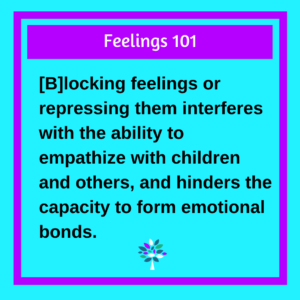Feelings 101

This is a quote from Debra Wesselmann’s book The Whole Parent: How to become a terrific parent even if you didn’t have one and in it, she talks a lot about the intergenerational transmission of trauma.
A common coping strategy used by people who have grown up in abusive, neglectful or toxic families is that they cut themselves off from feelings. Sometimes this is because they learned that expressing their emotions was dangerous. Sometimes it’s because they learned that expressing their emotions was pointless and did not result in any type of connection or caretaking.
Emotions are intended as ways of communicating and connecting with others. Sadness is an expression that often elicits caretaking from others and invites others to join you in common grief and mourning. Happiness is an expression that invites others to join you in celebrating. Anger is an emotion that lets others know you are not okay with something that is happening and invites others to make it right.
But if you have cut yourself off from those emotions, then you are limiting your ability to connect with others. If you have cut yourself off from emotion it is harder to understand and empathize with emotions in others. And this makes connecting with your own children difficult as well.
An important aspect of breaking the cycle of intergenerational transmission of trauma is learning how to connect to and feel your feelings. This can be a scary and difficult process. And this is why therapy can be so helpful. It is possible to both heal yourself and to stop the further transmission of trauma in your family. You can do this!










